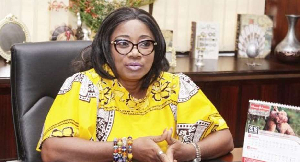A Research Fellow at the Institute of Economic Affairs (IEA), a local think tank, has stated that government is over spending, a development that is fast eroding the little gains made following the cancellation of the country’s debts.
Dr. Kwamena Anaman, who heads the Economics Centre of the IEA, said in an interview with the dailyEXPRESS and the Washington Post newspapers that government’s level of expenditure today is a far cry from what pertained in the first five of its administration.
“So some of us thought the years ahead will be good but that is not what we’re seeing,” he lamented, adding “it’s more like getting out of jail and going back to do the very things that got you in there.”
The NPP administration of John Kufuor is in the last year of its second term in office, having assumed office in 2001. The country went HIPC during the government’s first term as a result of which its debts were cancelled.
Dr. Anaman says the economy was in good condition during the first five years of the government because most donors cancelled the country’s debt and we could not afford to thread on dangerous ground. The situation has however changed, citing the huge spending on the country’s 50th Independence celebrations and other activities. According to him, it appears the cancellation of the country’s debt has somewhat given room for government to engage in the newly picked-up habit, at a time it says it is aiming at achieving a middle income status.
He cautioned government against the practice, noting that “the spending is not something within the resources you have.” The IEA Economic Centre Head who is also in charge of Research stated that nobody can justify the huge spending of public money for the celebration of the country’s 50th anniversary, insisting that a modest celebration in that regard would have been more prudent.
Dr. Anaman told Washington Post’s Globalisation Writer Anthony Faiola and the dailyEXPRESS’ Nii Osabutey Anny that the large resources spent on the celebration could have been used to improve the health delivery system or improve other areas that are much more of urgent need.
Cautioning further against government’s huge expenditures, the IEA Fellow warned that “if it’s not checked we can go back to the same path.” Another area he mentioned was the creation of additional 32 administrative districts, bringing the total to 170, concluding that it was an unreasonable exercise when the new districts could have been created over a period.
“You can spread that for a period of five or so years in order not to hurt the economy.” He also made reference to the planned construction of additional 15km stretch of roads in every district, describing that and other projects as an “erroneous leverage to win an election.” He cited the example of 1973-1974 when the then military regime of General Acheampong managed to stabilize the economy, but as a result of reckless spending, the economy got out of hand leading to job losses and high inflation rate. He is therefore worried that the current government is taking the same path especially in an election year, noting that it is not good for the entire outlook of the economy.
Dr. Anaman also criticised government for failing to adhere to its own manifesto of having Districts Chief Executives elected. According to him, that was one of the main campaign messages of the current government, arguing that it is unacceptable to allow a single person to hand pick people to represent the various districts as heads because that breeds corruption and they will ponder to the authority of the president. He made reference to the dismissal of some eight districts chief executives in the run up to the ruling NPP’s presidential elections because they allegedly refused to lend their support to Candidate Alan Kyeremanteng, who was rumoured to be the President’s favourite. “Our concern is having the power to appoint the mayors,” he told the reporters. “The mayors should be directly elected.”According to him even Zimbabwe with all its problems still find time to elect their mayors. Ghana, he mentioned, is supposed to be the standard bearer of democratic culture and values yet has blatantly ignored such core values and has taken the path of autocratic systems where such a practise exists.
Click to view details



Business News of Wednesday, 16 April 2008
Source: GHP
IEA: Economy suffering from government's overspending

















